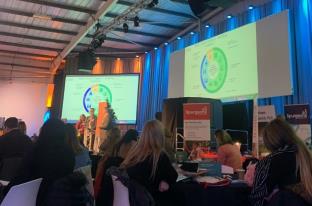Picture this: a deprived inner-city estate and a troubled 12-year-old boy repeatedly stopped by police for anti-social behaviour.
Things take a downward turn when he begins to hang out with older children and becomes involved in burglaries around the area.
The situation worsens when he’s excluded from two local schools and his mother is diagnosed with mental health problems.
Fast-forward a decade and that same individual is now behind bars, serving a lengthy custodial sentence.
He had become the leader of an organised crime group, using firearms and flooding the streets with Class A drugs.
His story is based on an actual case and is by no means an isolated one. There are hundreds of similar cases across the UK, raising questions about how correctly targeted, multi-agency support can prevent these individuals’ lives spiralling into the abyss.
Targeted support
The latest statistics certainly show the importance of getting this support right. Figures from the Office of National Statistics show the reoffending rate for children and young people has risen by 4% to 42.2%. This compares with a figure of 28.2% for adults.
Similarly, data for the number of permanent exclusions from schools shows an increase of 15%, with physical assault one of the key reasons.
However, despite limited resources, the authorities are learning more about such cases and are intervening earlier. There is certainly cause for optimism when it comes to their chances of success.
Councils are certainly working more collaboratively with partner agencies, such as health services and the police, than ever before. Information is being shared and advances in technology now make data an extremely powerful tool, particularly for local authorities and police in identifying future vulnerabilities earlier.
Single view
Sentinel’s own data software is helping a range of organisations to target support where it’s needed most by enabling them to identify the most vulnerable individuals in society, whether they’re at risk of harm or exposure to criminal activity.
It does this by bringing known information together into a clear and comprehensive single view and then placing them into the variety of groups in which they belong, such as their families, extended families and gangs.
The scope of data is unlimited and our clients are using data such as school absences and exclusions, police cautions, hospital attendance, criminal history of close family members and links to gang crime.
In determining people’s vulnerabilities, the decision about what factors to consider, thresholds to set and weightings to apply is taken locally by informed professionals - it certainly isn’t a case of technology and algorithms driving a one-size-fits-all solution. Our clients can set up all of this themselves depending on what scenarios they are looking for and which teams are involved.
Powerful technology can now be applied to help avoid cases slipping through the net by matching records, for example of individuals who have multiple addresses or use different names.
All this, combined with the ability to share data with key partners in a controlled and secure manner, makes it even less likely that cases will be missed.
Future vision
We’re now looking to the future - working in partnership with Microsoft, we’re evolving our solutions to help authorities monitor and learn from current data trends in order to achieve even more positive interventions going forward.
Precise and targeted profiling of existing datasets enables authorities to identify and understand certain scenarios that make problems more likely. This gives them a greater chance of alleviating future problems.
Recent media reports on so-called predictive analysis make slightly mischievous references to personal data and profiling – potentially leading to inaccurate conclusions and unwarranted concern.
The reality is that data is being used legitimately, to propose potentially vulnerable individuals earlier, helping professionals to make informed decisions that are based on events that have been recorded and shared by all their partner agencies.
Not only will this help to avoid tragic child protection cases such as Baby P and Victoria Climbié, through earlier intervention, it should also help the authorities devise and monitor more successful strategies to minimise such incidents in the first place.
Similarly, it also provides more chance of earlier help for children who start to fall foul of the law.
This can only be a force for good.



